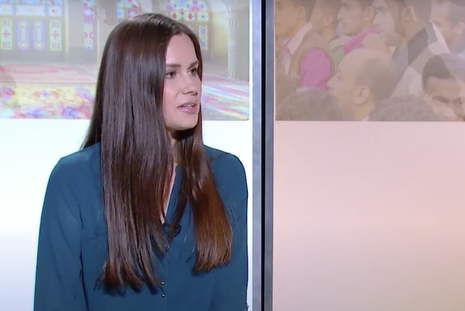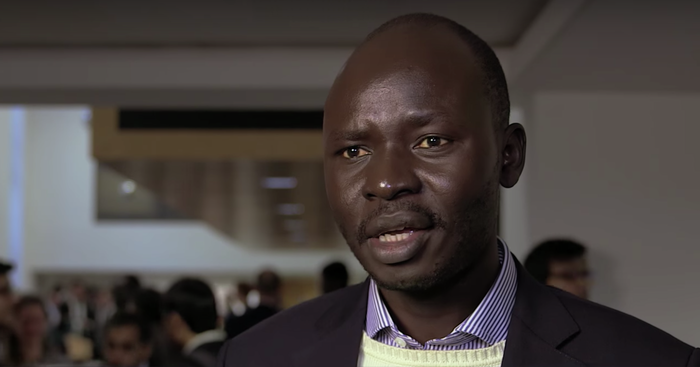Cambridge alumna moved to ‘notorious’ Iran desert prison
Dr Kylie Moore-Gilbert, who graduated from Cambridge in 2013, is serving a 10-year sentence for espionage

British-Australian academic Dr Kylie Moore-Gilbert, who had been held in Tehran’s Evin prison for nearly two years, has recently been moved to the ‘notorious’ Qarchak prison, a desert facility located 35km south-east of Tehran.
Moore-Gilbert graduated from Cambridge with first-class honours in Asian and Middle Eastern studies in 2013, after which she became a lecturer in Islamic studies at the University of Melbourne.
Qarchak prison, which is believed to hold 2000 women and some children, is described as ‘notorious’ for its ‘abysmal’ conditions. Iran Human Rights Monitor describe it as ‘the most dangerous and worst prison in Iran due to its inhumane medical and psychological conditions’.
In a report to Congress last month, the US state department listed Qarchak as a site for “extrajudicial killings, torture, or other gross violations of internationally recognised human rights”.
Moore-Gilbert's work focuses on the 2011 Arab spring authoritarian governance and the role of technology in activism. She was detained at Tehran airport in September 2018 after attending an academic conference. She was notified to the revolutionary guards as “suspicious” by another conference attendee and a person who she interviewed for her research.
She was convicted on charges of espionage. Despite denying the allegations, and no evidence ever made public to uphold the allegations, subsequent appeals of her sentence have failed.
At the beginning of this year, Moore-Gilbert wrote that she rejected attempts by Tehran to recruit her as a spy in exchange for her release.
In a letter to her “case manager”, Moore-Gilbert vehemently rebuffed overtures to spy for Iran: “I am not a spy. I have never been a spy and I have no interest to work for a spying organisation in any country. When I leave Iran, I want to be a free woman and live a free life, not under the shadow of extortion and threats.”
She also wrote that she had spent months in solitary isolation, living in a small cell and was blindfolded whenever prison officers moved her.
The Australian Government has also denied that Moore-Gilbert was involved with espionage. However, the Australian government has been criticised by some for not taking a stronger stance with Tehran with regards to Moore-Gilbert’s imprisonment.
An online petition called on the Australian Prime Minister, Scott Morrison, and British Prime Minister Boris Johnson to do all in their power to “urgently relieve the ongoing cruelty and hardship suffered” by Moore-Gilbert and to secure her release. The petition has reached over 27,000 signatures.
Human rights campaigner, Reza Khandan, who was previously jailed in Evin prison described Moore-Gilbert’s ‘outrage’ with the Australian government and embassy in Iran for “neglecting her continued detention and intolerable circumstances.”
However, in a statement on Tuesday (28/07), Australia’s Department of Foreign Affairs and Trade stressed that “Dr Moore-Gilbert’s case is one of the Australian government’s highest priorities”.
Moore-Gilbert’s profile is no longer visible on the University of Melbourne website. Last September, the University released a short statement highlighting that the University "will continue to be in close contact with the Australian Government and Dr Kylie Moore-Gilbert’s family," but emphasised that her case "is a sensitive matter and the University will not be providing further comment".
Speaking on the phone to Khandan, Moore-Gilbert described how she felt “so very hopeless” and “can’t eat anything.”
She continued: “I am so depressed. I don’t have any phone card to call. I’ve asked the prison officers but they didn’t give me a phone card. I [was last able to] call my parents about one month ago”.
In correspondence to the prison bosses in August 2019, Moore-Gilbert pleaded to be moved from the confined 2a section to the general section of the prison for the female population. She wrote: “I think I am in the midst of a serious psychological problem, I can no longer stand the pressures of living in this extremely restrictive detention ward anymore…this is really inhumane.”
Nazanin Zaghari-Ratcliffe, a British-Iranian woman was also detained at Evin prison following a 5-year sentence for spying charges. However, unlike Moore-Gilbert, Zaghari-Ratcliffe is among the 100,000 prisoners in Iran who have been temporarily released because of concerns that Covid-19 may spread rapidly through the country’s overcrowded jails.
 News / Fitz students face ‘massive invasion of privacy’ over messy rooms23 April 2024
News / Fitz students face ‘massive invasion of privacy’ over messy rooms23 April 2024 News / Climate activists smash windows of Cambridge Energy Institute22 April 2024
News / Climate activists smash windows of Cambridge Energy Institute22 April 2024 News / Copycat don caught again19 April 2024
News / Copycat don caught again19 April 2024 Comment / Gown vs town? Local investment plans must remember Cambridge is not just a university24 April 2024
Comment / Gown vs town? Local investment plans must remember Cambridge is not just a university24 April 2024 News / Emmanuel College cuts ties with ‘race-realist’ fellow19 April 2024
News / Emmanuel College cuts ties with ‘race-realist’ fellow19 April 2024






